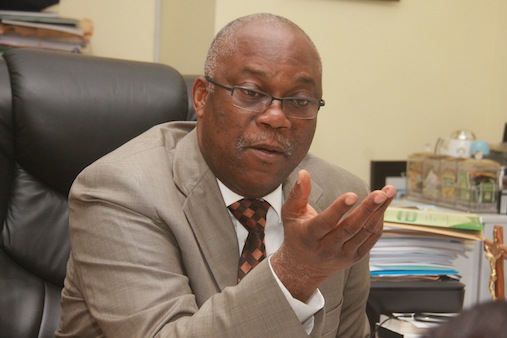The Director General of Standards Organisation of Nigeria (SON), Dr. Joseph Odumodu has said that Nigerians must change their consumption pattern for the economy to thrive, noting that anytime products are imported, Nigerians are paying the salaries of people abroad.
Speaking with newsmen in Abuja on Friday, Odumodu said that currently, the country’s consumption pattern was about 80 per cent of imported products.
He said no nation would become independent through importation and as such Nigeria needed to do more to ensure that its industries were functional to provide jobs for the youth.
“Anytime you are importing, you are paying salaries of people abroad.
“This is a highly populated country, where will our graduates work when there are fewer industries today than there were 20 years ago?
“There are more graduates today than we had 20 years ago; we have to begin to address these inconsistencies.
“So, as I am talking to you, eight out of 10 products used in Nigeria are imported.
“It is not good, it is something we must try to change in the next three to four years to reduce it to 50,” Odumodu said.
He expressed regret that some people preferred to do business that harmed other Nigerians by importing substandard products and that SON was determined to ensure the situation did not persist.
He said that in so far as the law had empowered SON to act, it required the personnel to enforce rules on the standardisation of products.
Odumodu said there were over 1,000 markets in Nigeria as well as many borders and that the only way to address the issue of standards was to get people to enforce rules.
“You do not keep the same person, if you keep the same person for three to six months, he will no longer see anything wrong with the importation of substandard products.
“I think government should approve over 1,000 people within the next three months and then people can see real impact of our enforcement activities.
“We currently have about 1,400 people in SON and most of us are in technical areas, such as biologists, chemists and engineers.
“I think we have fairly enough to do the background job that we need to do,” Odumodu said.
According to him, some Nigerians have made billions of naira from importing sub-standard products into the country.
He said the new SON Act of 2015 had given the Minister of Industry, Trade and Investment the power to designate a port on the advice of SON for a particular set of products.
“Most of the bad cables that come into Nigeria are coming through the borders, they do not come through the ports.
“So, the new Act of SON, 2015 enables the Minister of Industry, Trade and Investment to designate a port on the advice of SON for a particular set of products when they are life endangering.
“We can now go to the minister and say we do not want the cables to come through the borders, we want them to come only through Apapa or Tincan Island.
“When that is approved by the minister it automatically becomes law and what it means is that if I see any cable at Seme Border, I can destroy it without testing,” he said.
According to him, when such law becomes effective the level of sub-standard products will reduce.
“I assure you that the new act brings relief to Nigerian industries, which means more employment, economic development and government will generate more tax.
“This is how it is all linked up and it is possible,” Odumodu said.
Odumodu said SON’s new disposition was giving those involved in illegal businesses a lot of nightmares with some in Alaba International Market, Lagos, and other markets accusing it of changing the rules.
“I believe that a good name is better than all these billions.
“So, when I started in 2011, I went to Alaba, went to all these big markets and they said: `Odumodu, you are trying to change the rules. You are making new laws’.
“I told them that we do not make law in SON; we merely insist that people must comply with the law,” Odumodu said.
Copyright Ships & Ports Ltd. Permission to use quotations from this article is granted subject to appropriate credit given to www.shipsandports.com.ng as the source.

